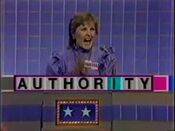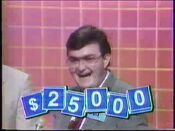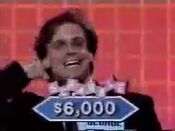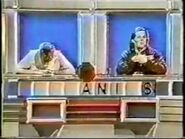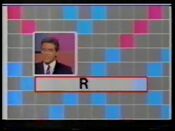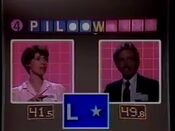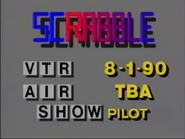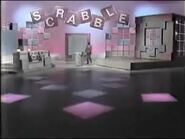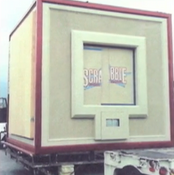| Hosts | |
| Chuck Woolery (1984–1990, 1993) Steve Edwards (1990 Pilot) | |
| Announcers | |
| Rod Roddy (1984 Pilot) Jay Stewart (1984–1985) Charlie Tuna (1985–1990, 1993) | |
| Broadcast | |
| Pilot: 3/8/1984 NBC Daytime: 7/2/1984 – 3/23/1990Unsold Pilot for Daily Syndication: 8/1/1990NBC Daytime: 1/18/1993 – 6/11/1993 | |
| Packager | |
| Reg Grundy Productions | |
Scrabble, the world's most popular crossword board game turned into a TV game show.
Gameplay
Basics
Crossword
The Crossword game was played with two contestants looking at a computer-generated image of the world-famous Scrabble board. One letter would be given at the start in the center square with the star, then host Chuck would tell the players the number of letters in a word, and then he read a clue to that word. Then the contestant would (usually) take two numbered tiles from a rack between the contestants. The tiles would then be stuck into a slot to reveal two letters. The contestant would then choose which letter to place into the word first to see if it works. A correct letter was placed in its proper position in the word. When placed into the word, the contestant would then either take a guess or place the other letter. If the player still couldn't guess the word, then he or she had to then select two more tiles. Play continued until the player decided it was time to take a guess by hitting his/her button (there was no need to hit the button in earlier shows), or if all but one letter appeared. A correct guess won the word, but an incorrect guess passed control to the opponent. Guessing the word wasn't easy because of the fact that there were three extra letters in the rack of tiles that don't fit, called "Stoppers"; when a player selected a Stopper, control also passed to the opponent.
Along the way, players could pick letters that fell into colored bonus squares, either blue or pink (unlike the board game, there were no red squares). Early in the run & in the 1990s version, whenever a bonus square was landed on, money was (potentially) added to a pot; for most of the 1980s run, landing on a bonus square, and then identifying the correct word won bonus money, which was kept win or lose; if, however, a player landed on a bonus square, and answered incorrectly, the opponent could steal the bonus money by identifying the correct word. The blues were worth $500, and the pinks were worth $1,000. Originally, a chyron graphic flashed the appropriate amount; later Chuck handed contestants the money in regular $100 bills, one at a time; still later, he handed out blue and pink colored bills called "Chuck Bucks", using the appropriate color for that square. The contestant can win a total of $3,500 in the main game if solving all three words with the pink squares and $500 for winning the game.
Once a word was finished, another word was played, using one letter from the previous word, and the player who was behind or lost the last word in case of a tie got to start. After five words, play continued with disconnected words until a winner was crowned. The first player to guess three words won the game.
Speedword
Whenever three stoppers were picked, (starting in 1985) when the game was at a 2-2 tie, or (in the second format) when time was running out, the game shifted into a Speedword round. After the third stopper, the contestant who control was passed to could either play Speedword or immediately take a guess at the risk of not being able to play Speedword if he/she was wrong. This was where letters in the word started appearing one letter at a time, and the numbered tiles were out of play. The first player to buzz-in with the correct word won the word, but buzzing in with a wrong word disqualified that player, allowing the opponent to either guess the word immediately or see more letters. Originally, the bonus squares had nothing to do with Speedword; that rule changed in 1986 when the bonus squares were always available.
The winner of the Crossword round won $500, plus a chance to play Scrabble Sprint.
Scrabble Sprint
The sprint round was played with two winners of the Crossword round, and consisted of three words (later four). On each word, host Woolery told the contestant how many letters were in the word, then read the clue. When Chuck said "GO", a clock started, and the contestant was shown two letters at a time. On each pair of letters, the player selected one to place into the word. Originally, a new letter would replace the chosen one; later once a letter was chosen, the other one would go back into a random shuffle. There were no Stoppers at all in this round: every letter was correct. When it was time to take a guess, that player hit a plunger to stop the clock and give his/her answer. A correct answer moved on to the next word, but an incorrect answer caused a ten-second penalty and stayed with that word. Play continued until all but one letter was placed; the contestant could allow five seconds to run safely without penalty by not guessing. Missing any words entirely had the contestant try to guess some make-up/alternate words. The round ended when the player guessed all the words right. The first contestant set the time, with the clock counting up; and the second player tried to beat the time, with the clock counting down. The player with the best time won the game & more money. The fastest time for a Scrabble sprint was 9.9 seconds, whereas the slowest was well over 100 seconds, with the board clock resetting to 00.0.
Versions
1980s
The show went through two formats in its six-year run.
Format #1
Two new contestants played crossword for the right to face the Scrabble Sprint champion.
In the first two weeks, the contestants played for money in the pot with $25 to start. Each correct letter was worth $25 more to the pot, while the colored squares added more money to the pot; blue squares were worth $50, pink squares were worth $100. The winner of Crossword won all the money in the pot, plus a chance to win triple value in Scrabble Sprint. Later, the pot was dropped in favor of the $500 prize for winning Crossword, with money for bonus squares added in later weeks.
Spelling
For three months in 1985, contestants not only had to say the correct word, but also had to spell the correct word one letter at a time. This was also when contestants were required to buzz in to guess. Similar to the format used during the first two weeks, each correct letter added money to a pot: Regular squares added $50, blue squares added $100, and pink squares added $200 (later $500). In one episode, two contestants (Chris & Von) repeatedly failed to spell the word "mosquitos" correctly, despite knowing it was the correct answer. This rule was abandoned by the fall of 1985.
In Scrabble Sprint, the Crossword winner (now dubbed the challenger) had a choice of one of two envelopes containing three words, pink or blue; the Sprint champion got whatever was left. The challenger had to set to time while the champion tried to beat the time. If the Sprint champion got all three of his/her words before the clock hit zero, he/she remained the champion; if not, then the Crossword winner took over as Sprint champion. The winner of the Sprint won $1,500 (or triple value of the pot in earlier weeks).
Later, both contestants played the same words. The champion was isolated offstage out-of-sight & out-of-hearing, while the challenger set the time the champion tried to beat when he/she returned.
If the Sprint champion could win five times in a row, he/she won a bonus of $20,000. Doing it twice (winning ten times) won another $20,000 bonus, for a potential grand total of $55,500 (more than that with the early pot format). This was later changed to having the champion's winnings upped to $20,000 for the first five wins, and upped to $40,000 for ten. Winning ten times also retired the champion from the show, and the next Crossword round was only played for a position as temporary Sprint champion. After the first Crossword round upon a champion retiring undefeated, another Crossword round was played to determine who would have a chance to play the Sprint against the winner of the previous Crossword Round.
Format #2
In the second format which debuted in 1986 because of a tournament (The $100,000 All-American Scrabble Tournament) using this format, four contestants (one a returning champion) played the game. Before the show, home viewers who sent the Opening Home Viewer Word would receive a Scrabble T-Shirt.
Each pair played Crossword for the right to play Scrabble Sprint. The champion played the first Crossword round every day, and his/her challenger went first; in the second Crossword (with two new challengers playing), a coin toss determined who went first. Plus each Crossword round was now timed, and when time was called, the rest of the round was played as Speedword.
In Scrabble Sprint, the winner of the first Crossword established the time, that the winner of the second Crossword had to beat. The winner of the game won $1,000 and the right to play Bonus Sprint for an increasing jackpot.
Bonus Sprint
In the Bonus Sprint, the champ of the day tried to identify two words in under ten seconds. Doing so won the jackpot which started at $5,000 plus $1,000 for every day it wasn't won. As the ten-second penalty remained in effect, missing either word resulted in an automatic loss. Win or lose, the champ returned to play the next day.
Champions stayed on the show until they won five days or were defeated.
1990s
The 1993 version was played in the same way as the second format in the 1980s version, except that the bonus squares no longer awarded instant cash bonuses to the contestants; they now added money to the bonus sprint jackpot, which started off at $1,000. The Bonus Sprint jackpot carried over to the next show if missed on that particular show, until it was hit. The Bonus Sprint resetted back to $1,000 on the next show when hit. The highest Sprint jackpot in this version was $20,500. Contestants stay on for a maximum of 5 shows.
Special Weeks and Tournaments
Most of this information was provided by Don Minyard in a post on The Game Show Forum in 2003.
During its near six years on NBC daytime, Scrabble held numerous teen weeks along with college weeks, couples weeks, armed forces week, seniors week, a holiday kids week and celebrity weeks (including two of those weeks devoted to game show hosts) where the celebrities won money for the home viewers.
Also, Scrabble held two Tournaments of Champions, at least two Teen Championship Tournaments and The $100,000 All-American Scrabble Tournament.
In the first Scrabble Tournament of Champions (held in February 1985), the 20 biggest winners from the July 1984-January 1985 timeframe came back to compete for a progressive cash jackpot that started at $35,000 and increased by either $500 (for a blue square) or $1,000 (for a pink square) every time a player guessed the word when a chosen letter landed in the blue or pink square. Two of the champions competed in two crossword games with the winner of each crossword game receiving $1,000 and advanced to the Scrabble Sprint round to either set a time to beat or beat the time of the tournament by playing four words. At the end of the tournament, the player with the fastest sprint time won the entire cash jackpot which ended up being worth $49,500 and was won by Stephen Nadeth who wound up winning a grand total of $79,500.
In November 1985, Scrabble did a Tournament with the five best TV players going up against the five best Board game players. The TV players had previously played during the February-November 1985 timeframe; the board game players had previously played in national Scrabble tournaments. Like before, two Crossword Rounds were played, each game being worth $1,000. An additional $1,000 was awarded for any player who beat the Scrabble Sprint in less than 25.0 seconds. Four words were played. The grand prize was worth $25,000 and was won by Don Minyard, who originally played September 17-26, 1985. Ruth messed up on her third word, when she tried to break Don's time of 15.2 seconds.
For the second Scrabble Tournament of Champions (held in May 1986), the 20 champions who won either at least $20,000 or $40,000 came back to compete for a flat $50,000 cash jackpot. Not counting the five best TV Game players, these 20 champions had previously played during the February 1985-May 1986 timeframe. Again, two champions at a time played two crossword games and this time, the winner of crossword won $500 and if they guessed a word after a letter landed in a blue or pink square, they won that amount of bonus money (again either $500 or $1,000). The winner then played Scrabble Sprint and either set or beat the time by playing four words. The player with the fastest sprint time at the end of this tournament won the $50,000 and the winner of the 1986 TofC was John Heaner who wound up winning a grand total of $91,500.
The above format was used for the two Scrabble Teen Championship Tournaments (one held in June-July 1986 and a second in May 1988) where the top 20 teen champions from previous teen weeks competed for $50,000 in US Savings Bonds. The winner of the 1986 Teen tournament was Michael Witness-Warren who ended winning over $58,000.
On September 29, 1986, Scrabble began a three-month $100,000 All-American Tournament with a brand new format that would become permanent. 188 contestants selected from various nationwide searches competed. During the first 12 weeks of the tournament, four new players competed each day in a preliminary round with two crossword games with the winners each receiving $500 along with any bonus money ($500 for a blue square or $1,000 for a pink square) and played a Scrabble Sprint round playing four words and the player with the fastest sprint time of the day won an additional $1,000 and returned on Friday for a weekly playoff. The Friday shows consisted of the four daily winners playing in one of the two crossword games and the player with the best sprint time won an additional $5,000 and came back for the final week of the tournament.
For the week of November 24-26 (since there was no episodes due to Thanksgiving holiday programming), the three daily winners from Week 9 came back on the Monday, December 1st show to determine the Week 9 winner. For week 10 (December 2-4), the three daily winners from Week 10 competed on the Friday, December 5th show to determine the winner of Week 10. During those two weeks, the loser of the first crossword game played in the second crossword game.
The final week of the tournament (held the week of December 22-26), the 12 weekly winners along with four wild card selections competed in semifinal matches on Monday thru Thursday of the final week with the Scrabble Sprint winner collecting an additional $1,000 and advancing to Friday's final match to compete for the $100,000 grand prize. The $100,000 was won by Mark Bartos, who left with a final grand total of $112,000. The 1st runner-up was Ginger James, who received an additional $10,000 for a final total of $20,500. The other finalists were Bob Bergman and Rich Kolinski.
Pilots
1984 Pilot
Two contestants, one a returning champion, played the crossword game (just like in the second format of the series). What made this Crossword different was that the contestants played for money on each word, using the same pot format from the beginning of the series. The pot started at $25 on each word, and each correct letter added another $25. Colored squares added extra money in addition to the $25: blue squares were worth $125 ($100 + $25) and pink squares were worth $225 ($200 + $25).
Four words were played, and on the last word, the dollar values were doubled, meaning that correct letters were now worth $50 for normal white squares (with that amount put into the pot to start), $250 ($200 + $50) for the blue squares and $450 ($400 + $50) for the pink squares. The contestant who guessed the word won the money in the pot for that word alone, and the contestant with the most money after the fourth word won the game, and earned the right to play the Scrabble Sprint as usual.
In the pilot's Scrabble Sprint, the winning contestant faced the contestant with the fastest Scrabble Sprint time of the week. Scrabble Sprint play was the same as always except that only the Crossword winner could play it, and there was a choice of five envelopes at the start of the week with one less choice each day. The player who guessed four words in the fastest time possible at the end of the Friday episode won $25,000 in cash.
In addition to the different graphics and Rod Roddy announcing, the chase lights were much faster. The opening shot from the Pilot was used in the 1984-Spring 1986 episodes.
1990 Pilot
Taped 8/1/90 on what would become the 1993 set (and using a cue from that version as the main theme), the basic format of the original run remained intact, except that each game had a theme for all the words used. Steve Edwards (who had previously hosted the 1977 pilot Get Rich Quick! and the 1979 pilot Pandemonium and is better known for KTTV's Good Day LA and the long-forgotten national counterpart Good Day Live) hosted here, as Chuck Woolery's contract with Love Connection did not permit him to host another syndicated show. This was intended for daily syndication via Group W Productions (Westinghouse), but due to a variety of factors, including a crowded market and USA Network's reruns of the 1984-90 episodes, it was not picked up for a series order.
The Set
The centerpiece of the 1984–1990 set was a giant rotating cube, which moved back and forth. Two sides were lighted Scrabble boards; one side was a rear projection screen used for the Crossword game, concealed by two sliding doors, with two screens below it for the letters. The fourth side was used for the Sprint rounds, a nine-screen display, again with two screens below it for the letters.
For the 1990 pilot and 1993 revival, the new cube had all four sides the same as the original; it had a Crossword side, two Scrabble Board sides and a Sprint side, but unlike the 1990 pilot, the crew was never able to get the cube to rotate when the revival series began. So the cube became stationary, although it still moved back and forth, with the rear projection screen used for all rounds.
The constant was the contestant area, which turned 90 degrees to reveal the Sprint area. In late 1986, a Scrabble sign was added at the top of the Crossword area; prior to this there was no sign except during special events including "Teen Weeks". After the regular sign was added, a new "Teen Week" sign was added for those weeks.
For the Crossword game, Chuck stood at a small podium next to the cube, which faced the contestants. Chuck's podium was removed from the set when the sprint round was played.
For the 1980s series, there was a giant pink Scrabble sign that hung over the set. The sign went up when the crossword game was played. Starting in mid-1986, spotlights would dance across it two letters at a time (similar to the 1980 Blockbusters sign). On the first finale in 1990, Chuck mentioned that the sign was held by thin wires; he even feared that he was going to lose his neck if the sign was going to come down on him, but it never did. The 1984 pilot didn't have that sign; instead, a superimposed blue logo appeared in its place during the opening & closing of the show. The 1990 pilot and 1993 revival also didn’t have that sign; instead, there was a new, smaller on-the-floor Scrabble sign.
Trivia
Prior to the 1990 syndicated pilot that ultimately did not sell, by as early as December 1985, Reg Grundy Productions was attempting to match the success of Wheel of Fortune (Sajak & White) by offering a nighttime version of the show for first-run syndication with Genesis Entertainment as its distributing partner (and possibly replacing the nighttime Sale of the Century [Perry]) but not enough stations signed on for it.
In Popular Culture
A scene from the classic 1987 science fiction comedy film Innerspace features Jack Putter (played by Martin Short) watching the show during the bonus sprint round until Lt. Tuck Pendleton (played by Dennis Quaid) inside of his body destroys the television set.
Merchandise
A board game called TV Scrabble was released by Selchow & Righter in 1987; it was the only home version which was originally a board game itself, until Trivial Pursuit: Game Show was released by Parker Brothers in 1993.
Unreleased Game
A computer version of the game show, tenatively titled Scrabble: The TV Game, was going to be released for the Apple II, Commodore 64/128 and IBM-PC by Box Office in 1988 in conjunction with Selchow & Righter, but the game ended up getting cancelled during development.
Rating
Preemptions
See the preemptions of the show, click here.
Number of Episodes
1,458 (1984-1990 version)
Music
Marc Ellis & Ray Ellis
Inventor
Based on the board game of the same name by Selchow and Righter (later Milton Bradley/Parker Brothers, now Hasbro)
Studio
NBC Studios, Burbank, California
Similar Shows
Additional Pages
Scrabble/Quotes & Catchphrases
Scrabble/Picture Gallery
Scrabble/Video Gallery
Scrabble/Episode Guides
Links
Scrabble @ Tim's TV Showcase
Joe Madigan's Scrabble Page
Travis Eberle's Scrabble Page
Xanfan's Scrabble Page
Rules for Scrabble @ loogslair.net
Rules for Scrabble @ The Game Show Temple
1990 Scrabble Pilot @ usgameshows.net
Another Scrabble Rules Page
A blog about the TV Scrabble board game from 1987
FLIP THE TABLE: Episode 52: TV Scrabble





























